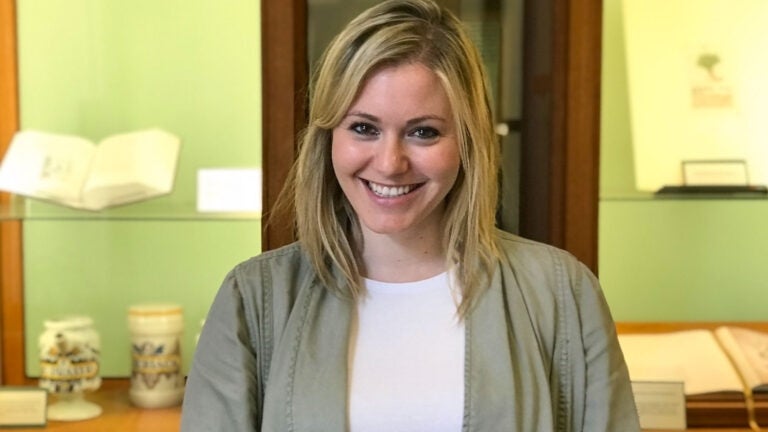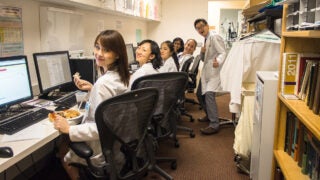
Margarita Ivanova was a teacher before she went to medical school, and now splits her time between shifts at LAC+USC and home with her husband and son. (USC Photo/Paul Boutin)
Balancing family and medical school? It shouldn’t make headlines, USC student says
While in medical school, Margarita Ivanova got married, had a son and encouraged countless Los Angeles high schoolers to pursue health professions and work in the sciences
Margarita Ivanova is a fourth-year Keck School of Medicine of USC student who balances medical school and family while on a rotation at Los Angeles County+USC Medical Center. She spoke with Paul Boutin of USC News about her commitment to community health and outreach to Los Angeles teens interested in science and health.
You took a surprising path to becoming a doctor. How did that affect the way you plan to practice medicine?
After graduating college, I taught high school for two years in a low-income school in Oakland. The health inequalities between my students and their more privileged counterparts were pronounced. Lack of access to food, safe spaces to exercise, primary care and overall health care (vision, dental services included) were realities of daily life for my students. Obesity was prevalent.
As a future physician, I aim to be mindful of the social determinants of health and to do my part to address health disparities, and my time in Oakland shaped these core aims. Focusing on adolescent health is something I’m sure of when I look toward my path of residency and beyond.
And now you’re mentoring kids who want to be doctors, right?
As a first-year medical student, I was a mentor in the Bravo Mentorship Program, which pairs medical students at USC with high school students at Bravo High School. I was a student at Bravo once myself, and I was a part of the program when I was in high school. As a medical student, I had the privilege of paying it forward as a mentor and eventually as a leader of the program.
My work with Bravo led me to look at new ways of engaging young people interested in health sciences. Through the Deans Research Scholar program at USC, I was able to dedicate a year away from med school classes to build the Health Sciences Mentorship Program at Renaissance Arts Academy, a local public charter school. With that program, we set out to remove barriers to participation that so frequently keep underserved youngsters from participating in science and career enrichment opportunities.
For example, we did not set prerequisite coursework or grade-point expectations — we welcomed every student who was interested, instead of filtering some out based on applications. And we structured the program to occur within the school day when all students would be available. The program’s main components are weekly 90-minute talks given by health sciences professionals — MDs and PhDs from USC, UCLA and other universities.
How do you get students to see themselves as future health professionals?
RenArts serves a diverse population, more than 70 percent of whom come from underserved socioeconomic backgrounds, and it was critical to the project that RenArts students could see themselves in the professionals sharing their work. We invited a diverse group of speakers who talked honestly about social inequities and discrepancies in health care. The mentorship program is now an integral and permanent component of RenArts.
We had 70 scholars in the first year — this year we had over 90; interest for next year looks to be well over 100 students. The school has a 100 percent high school graduation rate with 97 percent accepted to four-year colleges. To me, RenArts is social transformation, and I’m thrilled to be an ongoing part of this special place.
You also got married and have balanced medical school and family. How have you done that?
My son, Arie, is 2 years old now. Being a mom and a medical student is something I am so grateful for. Each one makes me better at the other.
When people hear I have a kid, they often ask how I balance being a mom and a medical student. My responses are hesitant — I can’t imagine not balancing the two. Arie makes me a better person and a better future physician. What I see every day in my job makes me all the more grateful for what and who I have the privilege of having at home. I hope that someday we live in a world where being a mom and a medical student doesn’t warrant a headline.
How does your USC experience relate to your values as a future physician?
USC was my dream school and top choice. Its commitment to building a community of health sciences professionals who serve L.A.’s diverse community is why I chose to come here. We don’t turn anybody away from the hospital. It’s a special place to me — I used to park on the top level of the Biggy Lot [a parking structure on the Health Sciences Campus] in the mornings before classes for the view of the hospital from up there, just to remind myself of why I want to be here of all places.



